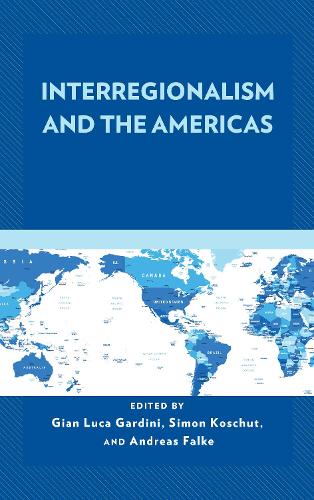
Interregionalism and the Americas
(Hardback)
Publishing Details
Interregionalism and the Americas
By (Author) Gian Luca Gardini
Edited by Simon Koschut
Edited by Andreas Falke
Contributions by Anna Ayuso
Contributions by Andreas Falke
Contributions by Gian Luca Gardini
Contributions by Susanne Gratius
Contributions by Simon Koschut
Contributions by Andrs Malamud
Contributions by Frank Mattheis
Bloomsbury Publishing PLC
Lexington Books
15th October 2018
United States
Classifications
Professional and Scholarly
Non Fiction
Globalization
Politics and government
327.7
Physical Properties
Hardback
252
Width 159mm, Height 230mm, Spine 25mm
549g
Description
This book addresses the question of how the American continent engages with various forms of interregionalism, including how different regions within the Americas deal with other regions of the world as well as how they relate among themselves. The presence of different political, economic, and cultural sub-regions within the Americas makes the continent a perfect setting to explore differences and commonalities in the western hemispheres relationship with other regions across the globe. Interregionalism and the Americas tackles three unifying questions. First, what type and understanding of interregionalism characterize the Americas way to interregionalism, if any Second, is summitry ultimately the major visible feature of interregionalism in the Americas and beyond Third, is there anything typical or characteristic in the way in which the Americas engage with interregionalism This book contributes both to the theoretical debates about interergionalism and to the empirical understanding of the phenomenon and makes a compelling case to strengthen the inter-American system and to advance a trilateral interregionalism mechanism between North America, Latin America, and Europe to stand up for their common values, norms, and preferred international order.
Reviews
This rigorous and tightly edited volume leads the way into the next generation of scholarly work on interregionalism in global politicsbeyond EU-dominance and Euro-centrism. -- Fredrik Sderbaum, University of Gothenburg, Sweden
This is a very timely and important book which includes many renowned scholars. It tries to capture the moving target of interregionalism by developing a new typology which is applied to the interactions of the Americas with other regions such as Europe, Southern Africa, and East Asia. A major topic is the role of summits as an instrument of interregional relations. What makes this book unique is its focus on the interregional relations of the Americasboth North America (with the United States) and Latin Americaoffering new insights on an evolving subfield of international relations. -- Detlef Nolte, GIGA Institute of Latin American Studies
At a moment in the post-Cold War history when the principles of multilateralism have come under heavy attack, Interregionalism and the Americas is a timely contribution to the revived debate on regions and regionalisms. Conceptually it takes the discussion to a new level by emphasizing the numerous ways in which the various, often fuzzy "Americas" are politically and institutionally entangled with other world regions. The scope of the book is equally rich, covering security politics, trade, investment, etc. This is an important contribution to decentering the European Union as the previous centerpiece of the interregionalism debate. -- Ulf Engel, University of Leipzig
Author Bio
Gian Luca Gardini is chair of international business and society relations at Friedrich Alexander University, Erlangen-Nuremberg. Simon Koschut is visiting professor in international relations and European integration at the Otto Suhr Institute at the Freie Universitt Berlin. Andreas Falke is professor of international relations and chair of US and international studies at Friedrich Alexander University, Erlangen-Nuremberg.
